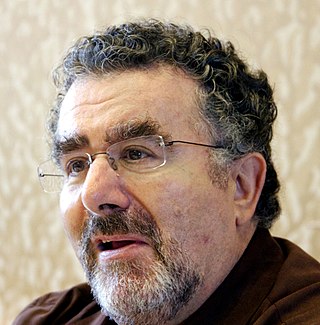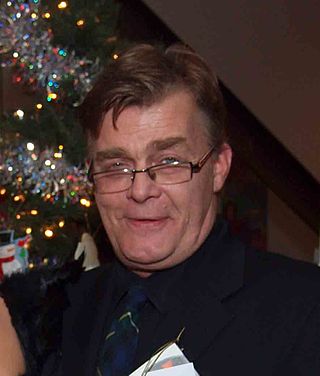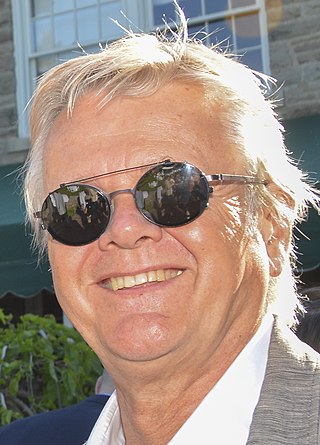Related Research Articles

Hard Core Logo is a 1996 Canadian music mockumentary film directed by Bruce McDonald, adapted by Noel S. Baker from the novel of the same name by Michael Turner. The film illustrates the self-destruction of punk rock, documenting a once-popular band, the titular Hard Core Logo, comprising lead singer Joe Dick, fame-tempted guitarist Billy Tallent, schizophrenic bass player John Oxenberger, and drummer Pipefitter. Julian Richings plays Bucky Haight, Dick's idol. Several notable punk musicians, including Art Bergmann, Joey Shithead and Joey Ramone, play themselves in cameos. Canadian television personality Terry David Mulligan also has a cameo, playing a fictionalized version of himself.

Bruce McDonald is a Canadian film and television director, writer, and producer. Born in Kingston, Ontario, he rose to prominence in the 1980s as part of the loosely-affiliated Toronto New Wave.

Don McKellar is a Canadian actor, writer, playwright, and filmmaker. He was part of a loosely-affiliated group of filmmakers to emerge from Toronto known as the Toronto New Wave.
The 7th Genie Awards were held on March 20, 1986, at the Metro Toronto Convention Centre to honour achievements in Canadian film in 1985. The ceremony was co-hosted by actors Leslie Nielsen and Catherine Mary Stewart.

Saul Hersh Rubinek is a Canadian actor, director, producer, and playwright.

Nicholas Campbell is a Canadian actor and filmmaker. He is a four-time Gemini Award winner, a three-time Genie Award nominee, and a Canadian Screen Award nominee. He is known for his portrayal of the eponymous character, coroner Dominic Da Vinci, on the crime drama television series Da Vinci's Inquest (1998-2005) and its spin-off Da Vinci's City Hall (2005-2006).
Peter Lynch is a Canadian filmmaker, most noted as the director and writer of the documentary films Project Grizzly, The Herd and Cyberman.
The Academy of Canadian Cinema and Television presents an annual award for Best Motion Picture to the best Canadian film of the year.
The Academy of Canadian Cinema & Television presents one or more annual awards for the Best Screenplay for a Canadian film. Originally presented in 1968 as part of the Canadian Film Awards, from 1980 until 2012 the award continued as part of the Genie Awards ceremony. As of 2013, it is presented as part of the Canadian Screen Awards.
The Academy of Canadian Cinema and Television presents an annual award for Best Achievement in Cinematography, to honour the best Canadian film cinematography.
The Canadian Screen Award for Best Achievement in Sound Editing is awarded by the Academy of Canadian Cinema and Television to the best sound editor on a Canadian film. The award was first presented in 1970 as part of the Canadian Film Awards, before being transitioned to the new Genie Awards in 1980; since 2013 it has been presented as part of the Canadian Screen Awards.
The Canadian Screen Award for Best Animated Short is awarded by the Academy of Canadian Cinema and Television to the best Canadian animated short film. Formerly part of the Genie Awards, since 2012 it has been presented as part of the Canadian Screen Awards.

Sturla Gunnarsson is an Icelandic-Canadian film and television director and producer.

James Allodi is a Canadian actor, writer and director.
John Kemeny was a Hungarian-Canadian film producer whom the Toronto Star called "the forgotten giant of Canadian film history and...the most successful producer in Canadian history." His production credits include The Apprenticeship of Duddy Kravitz, Atlantic City, and Quest for Fire.
Michael Mabbott is a Canadian film and television director and writer. He is best known for his debut feature film as a director, The Life and Hard Times of Guy Terrifico, which won the Toronto International Film Festival Award for Best Canadian First Feature Film at the 2005 Toronto International Film Festival.
The Academy of Canadian Cinema and Television presents an annual award for Best Feature Length Documentary. First presented in 1968 as part of the Canadian Film Awards, it became part of the Genie Awards in 1980 and the contemporary Canadian Screen Awards in 2013.
The Academy of Canadian Cinema and Television's Award for Best Short Documentary is an annual Canadian film award, presented to a film judged to be the year's best short documentary film. Prior to 2012 the award was presented as part of the Genie Awards program; since 2012 it has been presented as part of the expanded Canadian Screen Awards.
Arrowhead is a 1994 Canadian mockumentary short film, directed by Peter Lynch.

Reindeer Station is an uninhabited locality in the Northwest Territories, Canada. It is located in the Caribou Hills, along the Mackenzie River's eastern channel. The community was established in 1932 to house a herd of 3,442 reindeer purchased by the Government of Canada. The venture was intended to replace the traditional livelihood of the local Indigenous peoples, but few chose to become reindeer herders, so the government eventually sold the animals. Reindeer Station was abandoned in 1969. Most of its residential buildings were relocated to the larger centres of Tuktoyaktuk and Inuvik.
References
- ↑ Tom McSorley, "The Herd: Peter Lynch and the secret history of Canada". Take One , Fall 1998.
- ↑ Glen Schaefer, "Herd another strange animal story". The Province , October 1, 1998.
- ↑ Liam Lacey, "Independent filmmaker finds freedom in the herd". The Globe and Mail , September 12, 1998.
- ↑ Peter Howell, "Perspective on Canadian films". Toronto Star , July 29, 1998.
- ↑ Bonnie Malleck, "A stirring look at the Arctic; TV tonight; The Herd traces the true story of six-year trek". Hamilton Spectator , October 4, 2001.
- ↑ "Who'll win the Genie awards?". The Province , December 8, 1998.